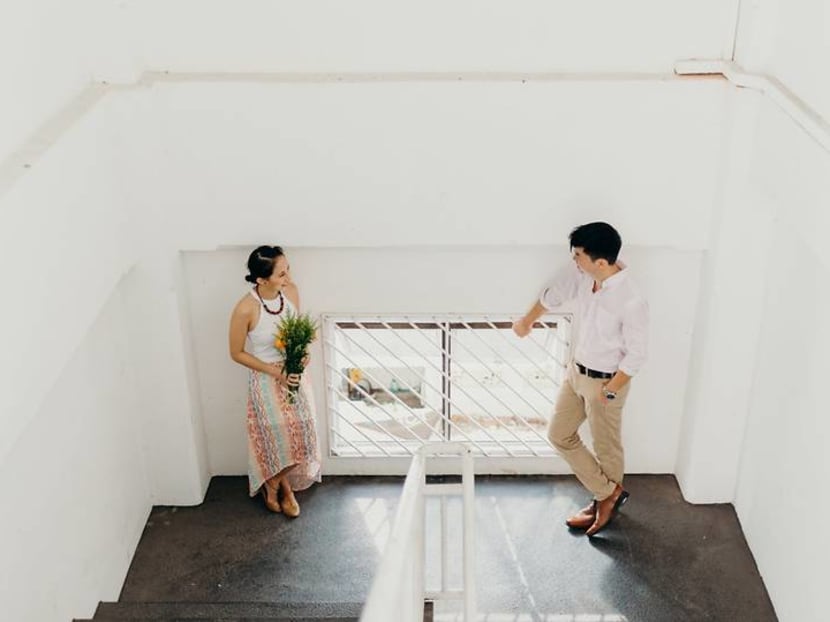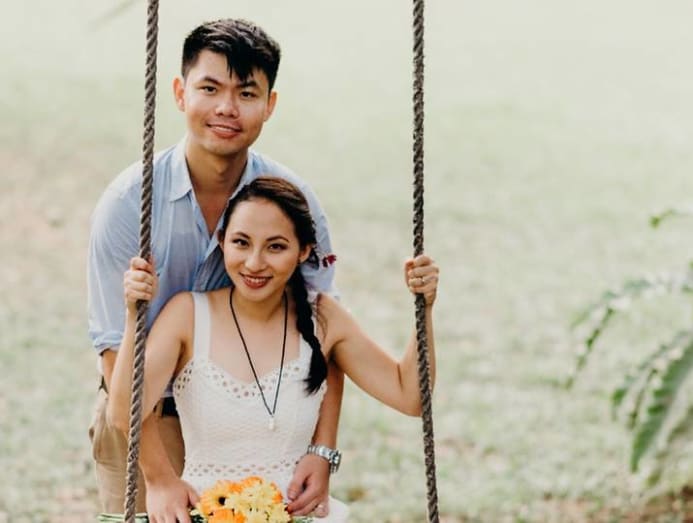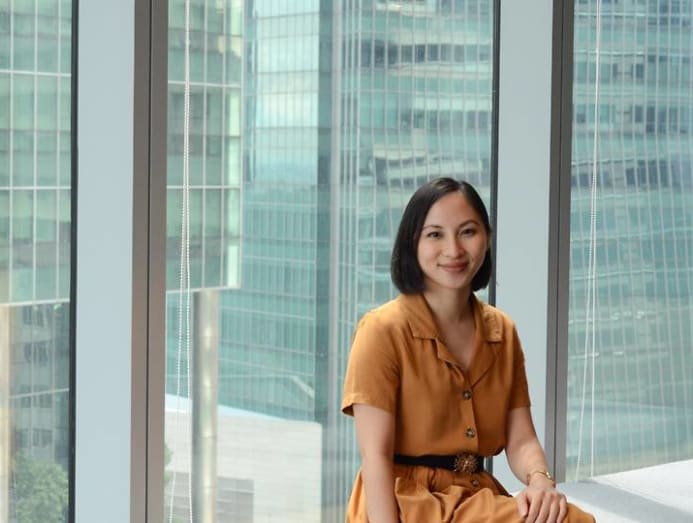Unhelpful comments and misguided support: Becoming a widow in your 20s
Coping with the death of a partner or spouse is usually something people face in later life. When it happens much earlier, it can present some different challenges, as a young widow who lost her husband when she was 26 told CNA.

Alyssa Reinoso and Tyler Hung were married for less than four months before he took his life. (Photo: Alyssa Reinoso)
SINGAPORE: Shortly after Alyssa Reinoso’s husband died, she caused her Grab driver to turn his head when she said that she was going to the columbarium at Mandai for her late husband.
The driver had been making casual conversation by asking her who she was visiting.
“I wondered, should I drop the truth bomb? So I said, oh, my husband. He literally turned 180 degrees to look at me, probably thinking, 'oh she’s young', 'I thought she’s older' or something,” she shared with CNA, laughing.
“At first, I would dread those kinds of reactions. Over time, I found them funny.”
This incident is one of the many with strangers Alyssa found herself having to navigate after she became a widow four years ago at the age of 26. Her late husband, Tyler Hung, was 29 then.
“Initially I struggled with how much to tell if people don’t already know. If I didn’t say anything, I felt like I was betraying his memory,” she added.
But this balance proved harder than Alyssa, now 30, expected. She recalled breaking down in a bank when she dealt with Tyler’s bank account.
“The bank teller … she was able to see the records and see our relationship, and she looked at me with such sad eyes. I was crying in a bank, and she handed me a tissue,” she said.
When she went to cancel Tyler’s phone contract, she told the telco outright that her husband was dead.
The detail that Alyssa doesn’t always reveal during these interactions is that Tyler died by suicide.
TYLER’S DEATH
Four years ago, Alyssa left the dishes in the sink after dinner at Tyler’s request. He was headed out, and said he would do them the next day. He never managed to.
Several hours later at 4am, police showed up at Alyssa’s home.
Tyler lived with Bipolar II Disorder - a condition that causes extreme and unusual shifts in mood, energy, concentration, and activity levels, affecting one’s ability to carry out day-to-day tasks.
His wife remembers him as a “massive extrovert”, who was “full of energy” and had “so much confidence” - and he struggled with suicidal thoughts.
“There was always the fear that I would lose him. I made sure I was on alert, that I was there to prevent suicide from happening. That meant being on call, being literally present, making sure that I could take him home after a night out,” she said.
READ: The rise of mental health awareness – and the stigma that remains attached to certain conditions
About two weeks before his death, Tyler started seeing a psychiatrist for medication.
“Once he started taking the medication, he told me that his moods were stabilising. He went out for drinks once, and returned without any ‘incident’. I was so relieved,” said Alyssa, who explained that her late husband had an unhealthy relationship with alcohol.
“That time, I thought, this is so rare. I think the medication is working. I think we're on the right track. And so, I think I put my guard down.”
REACTIONS TO A YOUNG WIDOW’S GRIEF
Along with her own grief, Alyssa had to deal with others’ reactions. Even as she found a way to use dark humour to cope, she still faced unhelpful comments, some of which centred around her loss as a young adult.
These included people telling her that because of her age she could marry again, strangers noticing her wedding ring and asking if a male friend she happened to be with was her husband, and relatives asking her parents why she was still “so deep in her grief” when they noticed she still talked about Tyler on Instagram two years after his death.
“It's probably healthier that I’m talking about it than if I’m not, right?” she said.

Alyssa also recounted meeting with an old friend who didn’t know how to broach the topic, despite wanting to be there for her. The friend ended up talking about her own newly married life.
“I remember just breaking down and crying into my food. After that, that friend never reached out to me,” she added, with an amused smile.
And when Alyssa landed her current job two years ago, a new environment and new people brought about “very intrusive” questions, she said.
When a colleague asked whether she was attached, they continued to probe after she told them she wasn’t.
“Oh this person really had it coming. I replied, because my husband died, and her face was like, oh my gosh. It got dark really quick,” she said.
HOW TO SUPPORT A YOUNG WIDOW
Experts who CNA spoke to acknowledged that the general perception is that widows are in their golden years, which could be the reason many people don’t know how to respond appropriately to a young widow.
“People might feel that the death of an older widow’s spouse is a natural process, usually due to old age. But people are not very familiar with how to react when you say someone in their 20s or 30s is a widow. They don’t expect that,” shared executive director of non-profit organisation Wicare, Edwin Lim, 37.
Whenever one meets a young widow, Mr Lim added, chances are her husband would have passed away from an “unnatural death”, like suicide, an accident or illness, which affects how people respond to a young widow’s grief.
READ: Commentary: Grief from losing loved ones to COVID-19 will spill into workplaces
As a result, unhelpful comments usually stem from the other person’s own discomfort around painful feelings, observed Ms Joan Khaw, Alyssa’s counsellor.
“Humans are very uncomfortable with their own pain, and even more so with other people’s. In reality, people who are grieving just want someone to emotionally or literally hold their hand and say, look, I don’t know what it feels like, but I’m here,” she said.
Ms Khaw, 65, said young widows like Alyssa don’t need to be told to date someone new.
“When dealing with a young widow, people assume they can start their life over again. What they want is the life they wanted that’s been destroyed to pieces. If it was so easy to piece back together, everyone would just move on,” she explained.
“Don’t assume she wants to. Don’t tell her she has time; she knows she has time. She's still missing a huge part of her heart. It's like a donut; there's a huge part that can never be filled.”
To help a young widow, Ms Khaw suggested talking about happy memories with them if you knew the deceased well.
“When they think of their late spouse, of course they remember the good times. But when you’re in so much pain, often the first memories that come up are the painful ones. Sometimes, there’s guilt from the widow too,” she said.
Even though “grief cannot be compared”, Mr Lim noted that young widows face a “very long journey” ahead of them. They might have just started a family when things fell apart, whereas older widows might already have children who are grown up and can support them.
“For younger ones, Wicare looks for opportunities to empower and elevate them, such as by asking them to build on their career.”
FINDING SUPPORT
For Alyssa, seeking support wasn’t the immediate thing on her mind after receiving the news. It would take over an hour before she could call her parents to break the news – and weeks before she began to grieve properly.
“No one talks about how much administrative work you have to do when you’re grieving. There’s no guide on what to do next,” she said.
“In the beginning, you just want to grieve, but you have to sort out so many things. There was a lot of numbness, trying to get through all the admin. It’s different from, say, losing a grandparent.”
While Tyler’s friends took over funeral arrangements, Alyssa had to figure out how to wrap up his business and inform his shareholders and clients about his death. He also didn’t have a will, which “really complicated things”, she said.
“Whatever money that we had that was shared assets, I wasn’t able to access it until about five months later, when I got a probate lawyer.”
In fact, she didn’t even know she needed a probate lawyer, until a friend who’d organised his grandmother’s funeral told her about it.
She also decided to move out of the apartment she’d shared with Tyler, sell the furniture, and move back home with her parents.
“Being a widow means your daily life has changed, but not so for everyone else. Literally nothing stayed the same for me,” she said.

When Alyssa finally found the support she needed, it came in the form of an Instagram hashtag. She stumbled upon a community of young widows via #YoungWidow, many of whom had also lost their late husbands to suicide.
“It’s almost like you’re all going in the same direction, but someone’s lit the road in front of you. I was able to know what’s coming ahead,” she said.
“I took a really proactive stance in the grieving process. I really wanted to know everything about grieving. I read so many books, and watched everything. I tried to learn what everyone else did when they were grieving. Maybe I was a Type-A griever,” she added.
“When you’re grieving, you want to find people as close as possible to your experience.”
If you don’t know how to respond, validating someone’s grief is often sufficient, she said.
“A friend told me, ‘You have lost the most. We’re all grieving him, but you have lost the most.’ That felt so validating to me. Yes, I have lost.”
Offering specific help is also useful, she advised.
“Telling people ‘I’m here if you need me’ isn’t as helpful as people think. It’s more helpful if you say, ‘I’m going to buy your groceries’, or be like my friend, who organised everything for the funeral. It’s about taking things out of someone’s hands and offering specific things.”
'A NEW GRIEF EVERY DAY'
Grieving her late husband is something Alyssa still goes through every day.
“It’s almost like a renewal, a new grief every day. Then you realise you’re grieving thousands of losses. You’re grieving a home, having children, all the dreams you had together,” she said.
“The first year that passed, I felt like I was living an alternate, parallel life. It’d be like, oh today we were supposed to do this or that, but here I am alone.”
The day CNA met Alyssa (Jun 16) would’ve marked the anniversary of their wedding ceremony in Bali. The couple got married in a civil wedding on Jun 27, and planned to hold a bigger celebration in Bali on Jun 16 one year later.
Big dates like these are still “really, really tough”, she said.
“Occasionally, it’s not even about holidays or anniversaries. For example, Tyler loved movies, and I find it really difficult to go into a cinema and watch a movie without tripping up,” she added.
Still, she plans to go through his list of top 20 films one day.
READ: Commentary: We still fail to understand that some people are more prone to mental illness
The hardest part of grieving, if she had to pinpoint one, is feelings of self-pity when she sees other people “getting married, having kids, progressing in life”, and she compares her life.
OPENING UP ABOUT TYLER’S STORY
Tyler’s death didn’t just change Alyssa’s life. It also changed her.
She started being vocal about mental health, despite not having done so previously. She even co-founded Calm Collective Asia, a mental health community, with two friends during the “circuit breaker” period.
The work she does with Calm Collective gives “purpose” to her grief.
“My way of processing is to find meaning, otherwise there’s just bottomless pain. If I think he died for nothing, that’s personally very painful to bear. That’s why I’ve chosen to find meaning through making mental health a cause I want to fight for,” she said.
But she fully understands many people don’t take that path - and they don’t have to.
“There are a million ways to grieve. Everyone finds their own way,” she added.

Advocating for mental health also meant she stopped “living in secrecy” about Tyler’s mental illness.
“The only person who was holding me back from speaking about it was Tyler, because it was his story, and he wanted to stay private. But I thought that was the core of the problem. He didn’t have an avenue to speak about his mental illness, and didn't have a way to process it. He had to pretend everything was okay,” she said.
“Trying to pretend you’re okay makes it even harder. I didn’t want to go through grief pretending everything’s fine or carry it all by myself.”
When she turned to Instagram to tell her story, she put an end to speculation about Tyler’s death at the same time.
There doesn’t have to be “one specific cause” or “a simple narrative” people can point to so they can understand his death, she said.
“It’s not that way. What he had was an illness beating up his brain."
Eventually, letting people read about Tyler on her social media accounts turned out to be the best way to reveal her situation, including to her boss.
Her boss found her on Twitter, where she’d shared a video campaign for the Samaritans of Singapore talking about Tyler’s death.
“My boss saw that, and without directly telling her, I was able to tell her,” she said.
“One reason I wanted to talk about Tyler on social media is so I don’t have to explain it. It’s easier for people to just read the things that I’ve thought about, written down and really crafted, rather than sometimes I’m caught off guard and just not ready to talk about it.”
Describing everything in her own terms ultimately gave Alyssa a sense of "agency", she said.
"I found my own voice. I’ve been able to grow a life that’s much bigger."
In this "bigger" life, there is still space for Tyler. Every year on his death anniversary, Alyssa treats herself to good food, sometimes fine dining, to honour the memory of her favourite foodie.
Where to get help: Samaritans of Singapore operates a 24-hour hotline at 1800 221 4444, or you can email pat [at] sos.org.sg. You can also find a list of international helplines here. If someone you know is at immediate risk, call 24-hour emergency medical services.
Wicare is contactable at 6354 2475 or contactus [at] wicare.org.sg.





